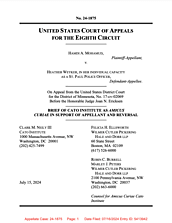In this case, the Eighth Circuit previously held that there was no federal Bivens claim available against Weyker for her actions under color of federal law. But the court left open the possibility that Weyker could be sued for actions in her capacity as a state/local official and remanded the case to the district court, which then dismissed the case on the grounds that, as a cross-deputized law enforcement officer, Weyker was not acting under color of state law.
In its amicus brief, Cato explains that holding government officials accountable for violations of constitutional rights is a fundamental part of our nation’s history and system of government. Moreover, the history of our nation’s primary civil rights law, Section 1983, shows that it was meant to be applied broadly to ensure that victims of official misconduct at the hands of state actors would have a remedy in federal court. And with the increase in the use of state-federal task forces, it is particularly important that the courts not create what amounts to a get-out-of-responsibility-free loophole for officers who commit civil-rights violations while simultaneously wearing state and federal hats. The Eighth Circuit should reverse the district court and allow Hamdi Mohamud’s claims to proceed against the St. Paul police officer who ruined countless lives and reputations by framing her and others for crimes they did not commit.


